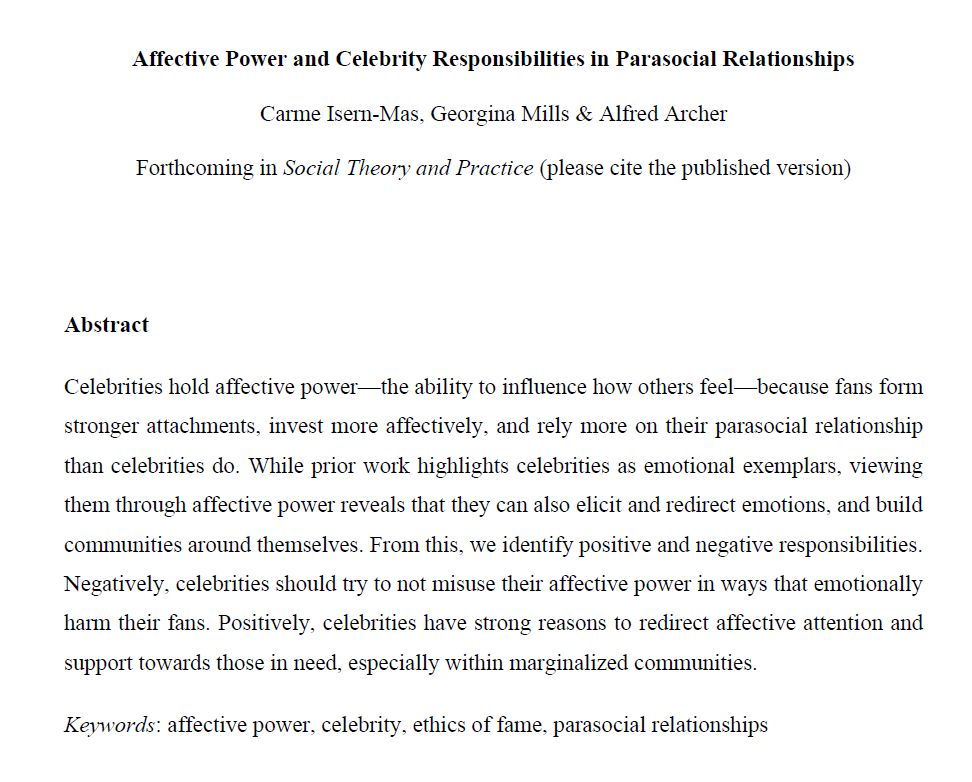@uib.cat . Moral psychology (moral emotions, moral motivation) and applied ethics (mental health, ethics of emotion).
Podcasts: https://beacons.ai/podcast_episodis
Why does the growing everyday use of psychotherapy terms feel both empowering and troubling?
Because two practices are at play: mental health-speak, which empowers, and therapy-speak, which distorts.
w/ @almagro.bsky.social
in @journalphp.bsky.social
🔓 tinyurl.com/24bhx4e9

Why does the growing everyday use of psychotherapy terms feel both empowering and troubling?
Because two practices are at play: mental health-speak, which empowers, and therapy-speak, which distorts.
w/ @almagro.bsky.social
in @journalphp.bsky.social
🔓 tinyurl.com/24bhx4e9
Remember Jonah Hill asking Sarah Brady to stop modeling to respect his “boundaries”? Or an abusive boss recommending mindfulness after your complaints?
@almagro.bsky.social and I are now ready to tell you when and why therapy-speak might be wrong.
🔓Link in reply

Remember Jonah Hill asking Sarah Brady to stop modeling to respect his “boundaries”? Or an abusive boss recommending mindfulness after your complaints?
@almagro.bsky.social and I are now ready to tell you when and why therapy-speak might be wrong.
🔓Link in reply
Is Taylor Swift responsible for how she makes her fans feel?
Yes; the notion of affective power (the ability to influence how others feel) can help identify the responsibilities celebrities have towards their fans.
w/ G.Mills & @alfredarcher.bsky.social
Preprint ⬇️

Is Taylor Swift responsible for how she makes her fans feel?
Yes; the notion of affective power (the ability to influence how others feel) can help identify the responsibilities celebrities have towards their fans.
w/ G.Mills & @alfredarcher.bsky.social
Preprint ⬇️
Link in comments ⬇️

Link in comments ⬇️
Do we shift our views on bioethical issues after reflecting on consequences?
TLDR: Yes, but not as we predicted.
Reflecting on consequences does NOT make views more progressive or unified.
w/ P. Bystranowski, I. Hannikainen & J. Rueda
🔓
dx.doi.org/10.1111/cogs...

Do we shift our views on bioethical issues after reflecting on consequences?
TLDR: Yes, but not as we predicted.
Reflecting on consequences does NOT make views more progressive or unified.
w/ P. Bystranowski, I. Hannikainen & J. Rueda
🔓
dx.doi.org/10.1111/cogs...
De moment, hem parlat sobre filosofia del xafardeig i de les vacances.
Link als episodis⬇️

De moment, hem parlat sobre filosofia del xafardeig i de les vacances.
Link als episodis⬇️

to the organizers of the Swiftposium, and to Catherine Robb or making it happen. ✨

to the organizers of the Swiftposium, and to Catherine Robb or making it happen. ✨
Fundació Grífols has been published – so much inspiration! 😍
And yes, that's me in the picture, very excited and grateful for my research grant on the cognitive bases of epistemic (and affective) injustice! 🙌
Link: www.fundaciogrifols.org/ca/research-...

Fundació Grífols has been published – so much inspiration! 😍
And yes, that's me in the picture, very excited and grateful for my research grant on the cognitive bases of epistemic (and affective) injustice! 🙌
Link: www.fundaciogrifols.org/ca/research-...
Thanks to everyone who's had my back (especially Jon Rueda 🙏).
Hope to honor the trust! 🙌
Gràcies!
Link below ⬇️

Thanks to everyone who's had my back (especially Jon Rueda 🙏).
Hope to honor the trust! 🙌
Gràcies!
Link below ⬇️

